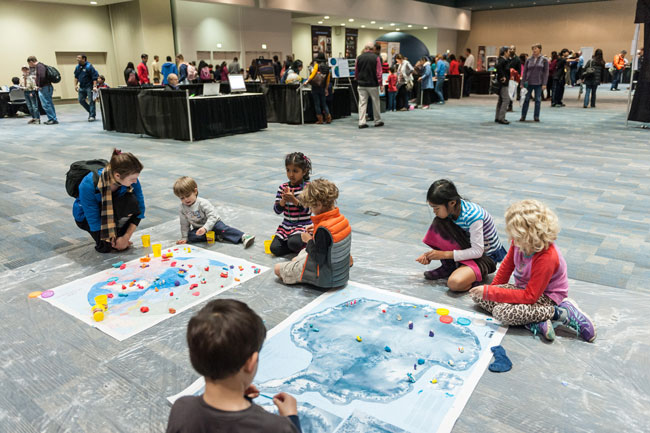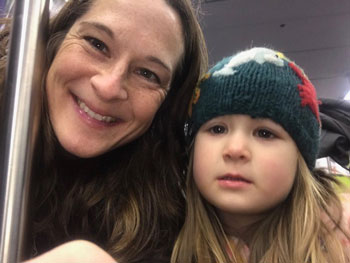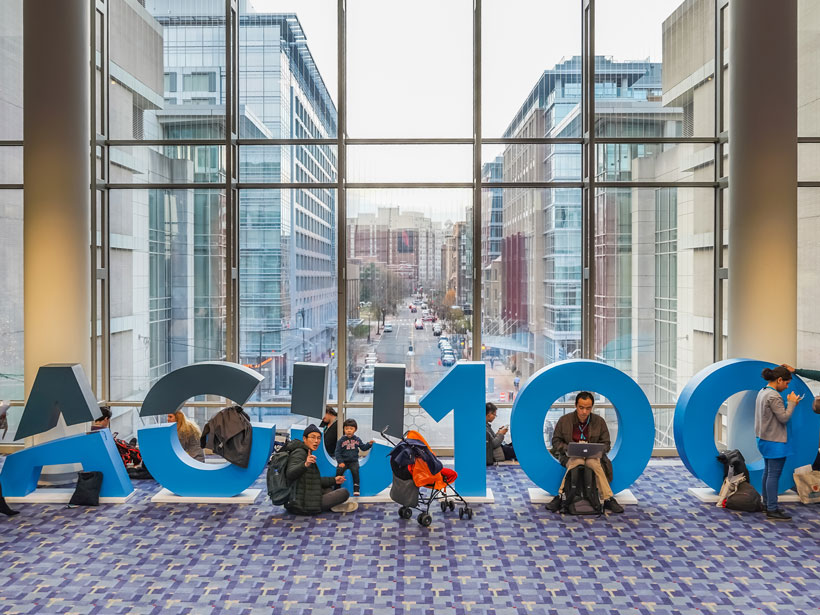Last December, several early-career biogeoscientists got some timely assistance at AGU’s Fall Meeting 2018. Early-career scientists are often starting families as well as careers, and caregiver responsibilities sometimes present a barrier that can prevent conference attendees from fully participating in conferences and obtaining the career benefits of sharing their research and networking with other scientists. These opportunities are critical for early-career researchers who are working to establish their scientific reputation and find jobs in research fields.
The year 2019 marks 100 years of AGU’s efforts to advance Earth and space sciences research, and AGU’s Fall Meeting 2018 served as the official launch of the centennial celebration. This year’s centennial celebrations are themed around promoting ideas that transform Earth and space science and how we conduct our research. In 2018, the Biogeosciences Early Career Committee saw this as a motivation to establish the Early Career Caregiver Award. This award was given to Biogeosciences section early-career members attending Fall Meeting who had extra financial constraints associated with being a primary caregiver for a child or other dependent.
An Opportunity to Meet a Need
In 2018, each AGU section received a budget of $5,000 to spend toward early-career programming at Fall Meeting 2018. The Biogeosciences section Early Career Committee decided to use a portion of the budget to fund awards to early-career members to offset conference attendance costs associated with being a primary caregiver. Such responsibilities can include daycare, hiring a temporary caregiver, covering conference registration costs of a child, or supporting a nonscientific partner’s attendance as a caregiver.

Published research and personal experiences of committee members demonstrated that childbirth and subsequent care of young children or caring for elderly or disabled family members can interrupt careers in science, technology, engineering, and mathematics (STEM), which provided motivation for establishing this award. A study showed that 43% of women and 23% of men among new STEM parents left the workforce, switched fields, or transitioned to part-time jobs, suggesting that early-career mothers (and, to a lesser extent, fathers) face challenges as caregivers with STEM careers [Bernstein, 2019; Cech and Blair-Loy, 2019].
Without supplemental childcare, a conference attendee may not have the time to be able to participate fully in the conference.
Attending a conference with a child or other dependent brings substantial financial costs, including travel and hotel rooms for the dependent. In addition, without supplemental childcare, a conference attendee may not have the time to be able to participate fully in the conference. Conference organizers face challenges as well as they attempt to support early-career parents and families [Calisi and a Working Group of Mothers in Science, 2018]. In particular, early-career mothers face a “baby penalty” that prevents them from enjoying a thriving conference experience. This penalty can be reduced if resources like lactation rooms, affordable on-site childcare, and childcare support are provided.
How do science conferences stack up now? The Science Careers team from the American Association for the Advancement of Science (AAAS) evaluated 34 conferences in North America in 2018. They determined that 94% provided lactation rooms and 68% provided childcare support, but the percentages are much lower for conferences in physical sciences, mathematics, and computer sciences [Langin, 2018]. Although the overall statistics are encouraging, these services are not enough for early-career parents for whom conference attendance requires extensive logistical planning and can be prohibitively expensive [Grens, 2017].
Beginnings of a Solution
The Biogeosciences Section Early Career Committee members (Benjamin Sulman, Aditi Sengupta, Zachary Brown, Melany Ruiz, and Ceth Parker), with help from 2018 section president Ariel Anbar and president-elect Elise Pendall, crafted an award announcement call and solicited applications from Biogeosciences section early-career members who are primary caregivers and were planning to present at Fall Meeting 2018. The announcement was advertised through social media and the Biogeosciences section newsletter.
The committee received 17 applications from early-career scientists ranging from Ph.D. students to assistant professors. The majority of applicants were early-career mothers. The evaluation criteria focused on two main points: the applicant’s need for support and how the award would improve the applicant’s ability to fully participate in the meeting and the potential of the award to enhance the applicant’s career through meeting attendance.
The solicitation recognized that early-career members may be caregivers for a disabled or elderly family member.
The committee disbursed eight awards of $500 each; additional awards would have been possible with more funds. Fathers made up 35% of the applicant pool, demonstrating the strides that fathers are making to share caregiver responsibilities. Nevertheless, the applicant pool demonstrated that women still bear the bulk of responsibility for child and dependent care, consistent with a wide body of research [Jolly et al., 2014; McBride and Mills, 1993; Pew Research Center, 2013; Yavorsky et al., 2015].
Although all of the applicants in 2018 were caregivers for children, the solicitation recognized that early-career members may be caregivers for a disabled or elderly family member. Thus, the awards were open to early-career attendees who were caregivers for any dependent rather than being restricted to parents of young children.
Evidence of Success
Many applicants were enthusiastic in pointing out the need for such awards. For example, Kim Novick, an award winner, says “the support made it easier to ensure my infant had high-quality care while I attended AGU. It also gave me a sense that the AGU Biogeosciences section valued my dual roles as a scientist and a parent to young children.”
As one of the awardees, Mary Whelan, points out, there is lack of institutional and cultural support to childbirth and subsequent care of young children, “with the awards serving as a way to retain productive STEM workforce by supporting their personal life-choices while enhancing their professional development.”

Caregiver awards and resources are critical to encourage women and men to stay in scientific fields through the early childhood years and provide shared experiences as a family, as noted by another awardee, Audrey Taylor.
Following the announcement of the awards, the Biogeosciences section and Early Career Committee received phenomenal support and kind words from many early-career members and late-career members. They reaffirmed that the awards supported inclusion and the success of early-career researchers whose responsibilities as caregivers currently pose challenges to their professional growth.
Building on Our Success
In addition to travel grants, we suggest broader efforts to support caregivers at the Fall Meeting. These efforts could include supporting facilities like lactation rooms, providing lockers or other spaces to parents to store caregiver-associated supplies, subsidizing on-site childcare costs for early-career attendees, reducing registration fees for supporting family members, and seeking additional sponsorship-based funding. Furthermore, we believe that it is essential for this program to develop a stronger and more stable base of financial support, rather than requiring individual sections to allocate ad hoc early-career funding. Support at the AGU level would allow the program to maintain long-term continuity as well as open it to conference attendees from multiple sections.
Supporting early-career members in their dual roles as caregivers and researchers will send a message of an inclusive and welcoming scientific society.
In addition to offering direct assistance to early-career conference attendees, another goal of the awards was to encourage other sections and AGU as a whole to support early-career members. We propose a society-wide change in which all sections unite to promote diverse representation by supporting early-career members as they balance their professional and caregiver responsibilities.
As a scientific community, if we truly are to stand for inclusive excellence and transformative science, it is imperative that we strive to support our members and welcome their identities. As AGU celebrates its centennial and looks forward to an exciting time in advancing Earth and space sciences research, supporting early-career members in their dual roles as caregivers and researchers will send a message of an inclusive and welcoming scientific society.
Acknowledgments
The authors acknowledge the AGU Biogeosciences section leadership, the award winners, and the early-career members who competed for the awards. This article complies with AGU’s data policy: The data are available from the authors on request. All opinions expressed here represent personal views of the authors and awardees and are not associated with the individuals’ institutions.
References
Bernstein, R. (2019), After a baby, 28% of new parents leave full-time STEM work, Science, https://doi.org/10.1126/science.caredit.aax0346.
Calisi, R. M., and a Working Group of Mothers in Science (2018), Opinion: How to tackle the childcare-conference conundrum, Proc. Natl. Acad. Sci. U. S. A., 115(12), 2,845–2,849, https://doi.org/10.1073/pnas.1803153115.
Cech, E. A., and M. Blair-Loy (2019), The changing career trajectories of new parents in STEM, Proc. Natl. Acad. Sci. U. S. A., 116(10), 4,182–4,187, https://doi.org/10.1073/pnas.1810862116.
Grens, K. (2017), Baby on board, Scientist, 1 Sept., https://www.the-scientist.com/careers/baby-on-board-30991.
Jolly, S., et al. (2014), Gender differences in time spent on parenting and domestic responsibilities by high-achieving young physician-researchers, Ann. Intern. Med., 160(5), 344–353, https://doi.org/10.7326/M13-0974.
Langin, K. (2018), Are conferences providing enough child care support? We decided to find out, Science, https://doi.org/10.1126/science.caredit.aaw3741.
McBride, B. A., and G. Mills (1993), A comparison of mother and father involvement with their preschool age children, Early Child. Res. Q., 8(4), 457–477, https://doi.org/10.1016/S0885-2006(05)80080-8.
Pew Research Center (2013), Modern parenthood: Roles of moms and dads converge as they balance work and family, Washington, D.C., www.pewsocialtrends.org/2013/03/14/modern-parenthood-roles-of-moms-and-dads-converge-as-they-balance-work-and-family/.
Yavorsky, J. E., C. M. K. Dush, and S. J. Schoppe-Sullivan (2015), The production of inequality: The gender division of labor across the transition to parenthood, J. Marriage Family, 77(3), 662–679, https://doi.org/10.1111/jomf.12189.
Author Information
Aditi Sengupta ([email protected]), Earth and Biological Science Directorate, Pacific Northwest National Laboratory, Richland, Wash.; Benjamin Sulman, Energy and Environmental Sciences Directorate, Oak Ridge National Laboratory, Tenn.; Zachary Brown, University of Tasmania, Hobart, Australia; Melany Ruiz-Urigüen, Department of Civil and Environmental Engineering, Princeton University, N.J.
Citation:
Sengupta, A.,Sulman, B.,Brown, Z., and Ruiz-Urigüen, M. (2019), Caregiver awards support early-career researchers, Eos, 100, https://doi.org/10.1029/2019EO121825. Published on 26 April 2019.
Text © 2019. The authors. CC BY 3.0
Except where otherwise noted, images are subject to copyright. Any reuse without express permission from the copyright owner is prohibited.

